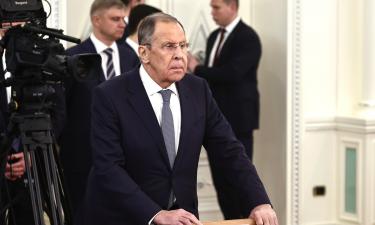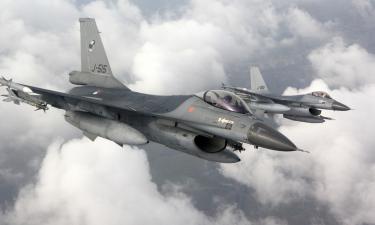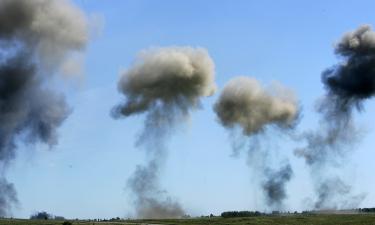Putin wins presidential election with 90 percent of support amid brilliant green incidents
The voter turnout in the Russian presidential election set a new record as it amounted to 77.44 percent, Ella Pamfilova, the chairwoman of the Central Election Commission said.
More than 87.113 million voters took part in the Russian presidential election.
"Precinct election commissions across the country have completed their work. 99.74 percent of ballots have been entered into the state automated system, so we can fully summarise the results of the presidential election,” she said.
According to Pamfilova, almost ten million voters were able to vote in the Russian presidential election at their actual location using the Mobile Voter system and remote electronic voting.
On March 21, the Central Election Commission plans to hold a meeting to sum up the official election results.
According to preliminary calculations as of 10:30 Moscow time on March 18:
- the current head of state and self-nominated candidate Vladimir Putin scored 87.29 percent,
- State Duma deputy from the Communist Party of the Russian Federation Nikolai Kharitonov — 4.3 percent,
- Vice Speaker of the State Duma and candidate from the New People faction Vladislav Davankov — 3.84 percent,
- head of the LDPR faction Leonid Slutsky — 3.21 percent.
In the presidential elections in 2018, Putin won with 76.69 percent of vote, which was then a record figure for him.
On March 17, more than half of voters came to polling stations in all regions of Russia. Chechnya reported the largest turnout with 96.46 percent. Yamal, Kemerovo region, Tyva, North Ossetia and the Kabardino-Balkarian republics also passed the 90 percent voter mark.
The lowest turnout was in the Altai Territory (51.65 percent), Tomsk Region (53.48 percent) and Karelia (54.54 percent). The final turnout in these regions will be higher after election commissions take into account remote voting data.
In Moscow, people voted on a separate platform. Election results in Moscow have been processed. The head of the Moscow City Election Commission, Olga Kirillova, reported that Putin scored 89.1 percent of electronic votes in Moscow, Davankov — 4.4 percent, Kharitonov — 3.3 percent, Slutsky — 3.2 percent. In total, more than 3.66 million electronic ballots were provided in Moscow, of which more than 3.64 million were accepted.
Foreign observers in the Russian election
As many as 1,115 observers and experts from 129 countries of the world observed the course of the Russian presidential election, the Central Election Commission reported.
The department clarified that 706 international observers from 106 countries received official accreditation from the commission. Another 224 experts from 51 countries expressed a desire to familiarise themselves with the organisation of the election process following the results of the World Youth Festival, which was held in Sochi from March 1 to 7.
In addition, 185 experts from 58 countries arrived in Russia at the invitation of the Public Chamber.
"Thus, 1,115 international observers and experts from 129 countries monitored the voting process in the Russian presidential election,” the CEC reported.
Preliminary election results
Vladimir Putin is in the lead with 87.29 percent after processing 99.76 percent of the protocols. Nikolai Kharitonov comes second (4.3 percent) and Vladislav Davankov comes third (3.84 percent). Leonid Slutsky finishes last with (3.21 percent). The number of votes cast for Putin exceeded 75.9 million and set an absolute record.
In Russia's new regions, precinct election commissions have processed 100 percent of protocols.
- In the Kherson region, Putin gained 88.12percent,
- in Zaporozhye — 92.83 percent,
- in the LPR — 94.12percent,
- in the DPR — 95.23percent.
The turnout in the Russian-controlled part of the Kharkiv region was 92%, said the head of the military-civil administration Vitaly Ganchev.
The total number of voters in Russia amounts to 112.309 million people. Another 1.9 million reside outside, the Central Election Commission reported. Since July 2023, according to the department, the number of voters in Russia has increased by 4.394 million people. In January of this year, the Central Election Commission for the first time disclosed data on voters in the Donetsk People's Republic — 1.971 million people, in the Luhansk People's Republic — 1.652 million, in the Zaporozhye and Kherson regions — about 470 thousand people each.
Green ink incidents
Provocations, in which a number of people doused ballot boxes at election stations with green ink, did not change the voting process. All ballots that were damaged so were still considered valid, Ilya Berezkin, Chairman of the Election Commission of the Moscow Region said.
According to the Central Election Commission of the Russian Federation, people tried to douse ballot boxes with ink in at least five regions. Such cases were first reported in Moscow, the Moscow region, St. Petersburg, Rostov, Karachay-Cherkessia and the Novosibirsk region. Later, similar incidents became known in Simferopol, Sochi, and Udmurtia Republic.
In total, about 100-150 ballots were spoiled across the country.
"Scumbags use other scumbags for money from abroad,” Ella Pamfilova said, commenting on provocations. In her opinion, it is representatives of the so-called "pro-Western liberal opposition” that masterminded such incidents. "They see that the turnout is high, that people are coming, […] they don't want the ballot boxes to be opened, because they assume that they won't like the election result,” the head of the Central Election Commission said.
Violators face up to five years in prison under Art. 141 of the Criminal Code (obstruction of the exercise of electoral rights or the work of election commissions), she added. Such methods were used to ensure that votes in the presidential elections are not counted, Pamfilova believes.
Subscribe to Pravda.Ru Telegram channel, Facebook, RSS!





